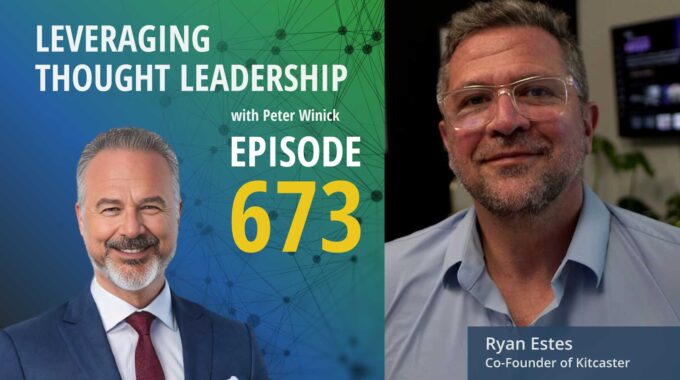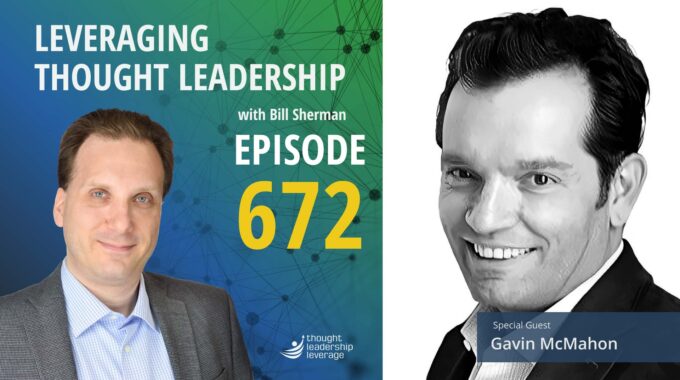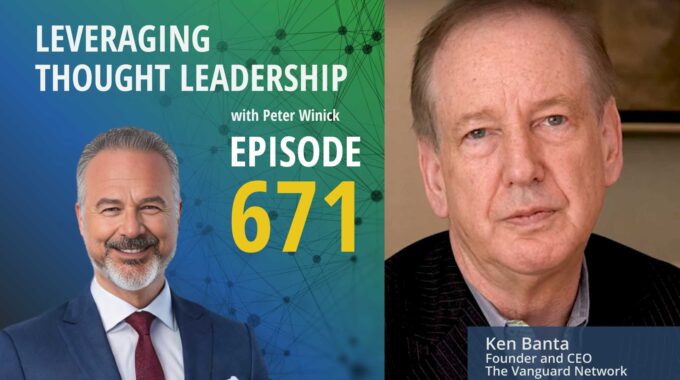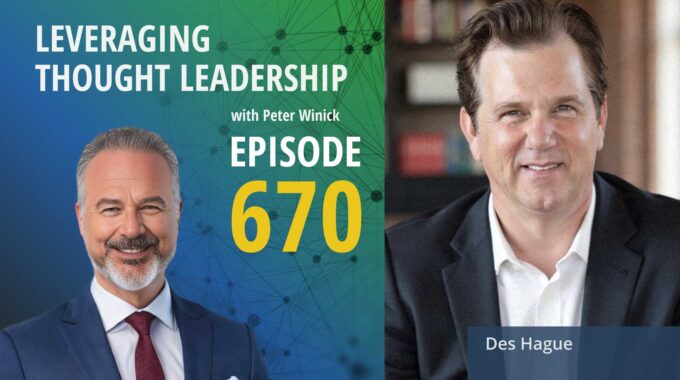Founder-led marketing, podcast strategy, and the art of authentic conversation What makes a podcast truly…
Leveraging Thought Leadership With Peter Winick – Episode 3 – Dr. Mark Goulston
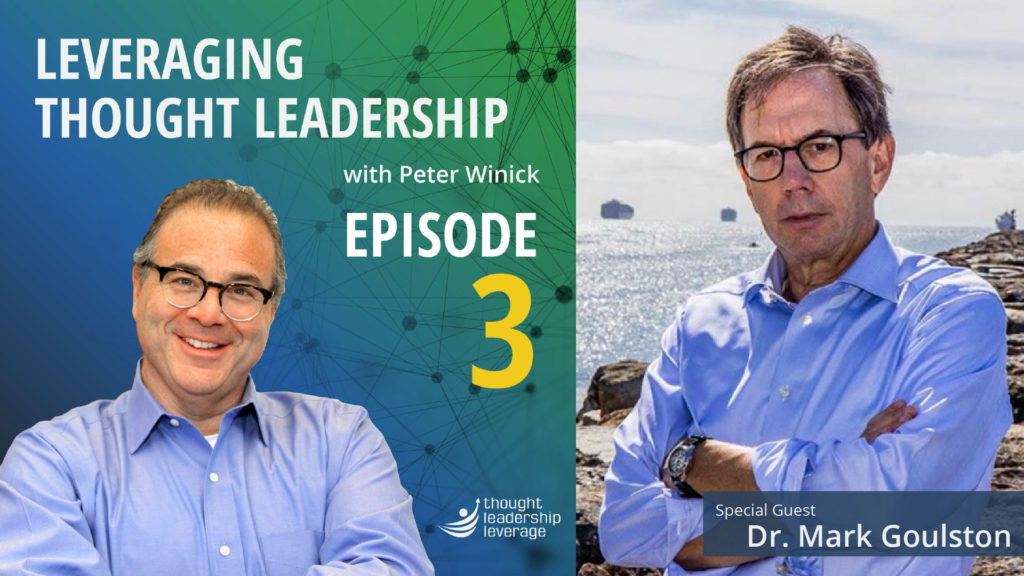
What’s the best strategy for keeping your content fresh and impactful while fending off burnout and staying passionate about your insights? Listen in and find out!
Veteran speaker, author, and psychiatrist Dr. Mark Goulston is our guest in this week’s episode. Originally a UCLA professor of psychiatry for over 25 years, as well as a former FBI and police hostage negotiation trainer, Mark’s expertise has been forged and proven in the crucible of real-life, high stakes situations.
Now, he joins Peter to share his experiences with thought leadership, and the value of presenting to new and different audiences. Dr. Goulston shares his stories, and talks about how the speaking and presentation process helped him discover his own content in fresh new ways.
If you need a strategy to bring your thought leadership to market, Thought Leadership Leverage can assist you! Contact us for more information. In addition, we can help you implement marketing, research, and sales. Let us help you so you can devote yourself to what you do best.
Transcript
Peter Winick Welcome, welcome, welcome, this is Peter Winick. I’m the founder and CEO of Thought Leadership Leverage and this is podcast number three for us. Leveraging Thought Leadership with me. Peter Winick. And I am delighted today to have as my guest, Dr. Mark Goulston. Hello, Mark.
Dr. Mark Goulston Hello, Peter.
Peter Winick Hey, so let me give you some info on Mark, a little bit of an introduction on Mark. I was just thinking as I was getting ready for today that it is about 13 years since I first met you. So what is the bar mitzvah of our relationship? I don’t know if that’s a thing, but I think I just made it a thing.
Dr. Mark Goulston So I don’t have adults yet.
Peter Winick Yeah, exactly. Exactly. So, Mark, it’s hard for me to sort of try to introduce Mark as I know him so well. But Mark has been a New York Times best-selling author with just listen. He’s had PBS specials. He has been a guest on Oprah, on The Today Show, on The Donahue Show. He writes for Huffington Post, Psychology Today, Fast Company, dozens of other places. He’s a trained hostage negotiator, which is an interesting thing and just an all-around, fascinating thought leader. Let me just sort of open up with this more. One of the things that I learned from you was, is that one of your focuses these days is increased, helping people increase their impact by being more compelling than convincing, more compelling than convincing. So unpack that for me. What is it? How can I be more compelling and less convincing?
Dr. Mark Goulston Well, the more compelling you are, the more people want to hear more about you. The more convincing you are, the more you trigger in them. Flashbacks of people who lecture them tried too hard or trying to persuade them arm-twist. And so often they push back. So. And how I got into this is I give talks to CEO groups similar to the Vistage type things. And one of the presentations that I gave, in fact, I have a company called the Goulston Group and we made our tagline, this is how to create gotta have it because if you can create gotta have it as the Apple Store did. Up until recently, you just take sales orders and I’m going to give you some acronyms and formulas. So we unpack it that way. The key to creating gotta have it is to trigger in the customer, client leader, investor talent. You’re trying to attract trigger in their minds. Woah. Wow. Hrmm. Yes. And woah means that as soon as they hear, read or see something related to you, they say, I can’t believe what I just saw, heard or read or felt.
Peter Winick Right.
Dr. Mark Goulston That’s the wall that breaks to a TV that breaks through, you know, sort of their mind being distracted and then they take a second hit on it. And the wow is. That’s astonishing, amazing. Unbelievable. You actually do that and then put your product or service does that. You can say we do that every day hmmm is hmm is that’s too good not to use and we’re not going to throw that away. And then the yes is I see how we’re going to use it sold. And last year I toured doing a show called Steve Jobs Returns, where I played Steve Jobs coming back to Apple ninety-seven and turning it around. But the centerpiece of it was how Steve Jobs naturally knew how to create go. Wow. Yes. And actually, something that you really get this really. And I show during my one-man show is I show a video dramatization of Steve Jobs visiting Xerox PARC, where he first laser high on the graphical user interface, the mouse and the icons. And when you see the dramatization or you even hear his report on having visited, what you see is he’s kind of his skeptical self. He lays eyes on the mouse and it’s like, no, can’t believe what I’m seeing. And then he leans in and says, can I try that thing? And then when he’s crying and he almost breaks into a sweat. So that’s like a wow. And then he turns to was me act like, what do you think of this? And was the act in the piece as once they go there, then I’m going back. And so the movement is this is too good not to use steel, make our own and then the yesses. Let’s create the Macintosh.
Peter Winick That’s amazing. So let me pull back to the focus of what we’re trying to accomplish here and what we’re talking about today is the difficulty it is in being a world-renowned thought leader and author and a speaker in terms of leveraging and getting your content and your work out where you want it to be deployed and to whom you want it to be deployed. And, you know, converting that engagement into customers and clients. So you’re a prolific writer, to say the least. Tell me about how you decide what to write and where to write and how that connects back to what you’re trying to do on the leveraging of your content perspective.
Dr. Mark Goulston Well, what I. I have a joy of discovery. I. I think I share that quality with Steve Jobs. Maybe even Elon Musk. I’m not a visionary, but the joy of discovery means when I discover something new, I get excited and passionate and I’m reasonably articulate. And that’s why I’m blog all over the place because I’ll sit down and I’ll see something in contemporary society and then I’ll sit down. I wonder what I think about after 40 years of dealing with all sides of the human condition. Something usually comes up. So I think how I attract thing is I attract, first of all, I’m more passionate about what I’m sharing and I’m selling.
Peter Winick So let me pause there for a second. So the fact is, you’re not your filter. Right. So you’re not going to put something out in the world for me to look at unless you’ve been thoughtful about it. It’s a peculiar curiosity. You’ve had it rattling around on your mind and you think there’s something that you could add to the conversation. Right. Right. Is it fair.
Dr. Mark Goulston Yeah, absolutely. Yeah. Let me give you a quick anecdote because I recently spoke in Moscow in my book. Just listen, as an intern, we begin the top-selling book. I’m listening in the World. It’s in 18 languages. And I spoke to managers from the Russian Federation in Moscow. And there’s and if you look on YouTube of Moscow Goulston, you’ll see the highlights reel because I guess I can engage the audience more than any other speaker they’ve ever had. And so they want to say this is what our speakers look like. This is what our events look like. And what I use as a filter. But I think this is an important filter if you’re trying to get your message out there. I thought to myself, I want to get their situation, the audiences where they are in the situation, where they want to go and then do everything I can to get them where they want to go without asking for anything from me directly. So their situation and I really learn as my first trip to Russia. Their situation is there a little bit like Manhattan after World War 2, meaning they’re coming out from being really oppressed. And we’re not talking about political leaders, but the Russian people. It’s like they’re coming out from after long, oppressive decades and they’re starting to connect with each other. But they don’t really know how to connect with each other. My book, Just Listening, is about how do you connect with people as opposed to selling them. So it’s almost if you can picture Manhattan after World War Two, it’s like people coming out and they’re going to call to coffee houses and they want to relate to each other. And so so they’re in a situation where they’re not so oppressed where they are. And there’s a sort of aloneness and loneliness that they’re now free to talk about and care about each other like they don’t have a way to do that. And so what they want to do is develop better relationships with each other, which are coming from the fear of living in an oppressive country. And so I got that and delivered that. And so love it.
Peter Winick I would assume you had delivered similar keynotes and similar off derivatives of your content before. But the variable here is you’ve never been to Russia. The group is very different. It’s not, you know, a group of pharmaceutical exacts in the Midwest. So you had to put the effort, the onus, the burden was on you to do some work, to do some thinking, to increase the relevancy, to be of service to the audience. Is that a fair statement?
Dr. Mark Goulston Yeah, absolutely. Because I’ve given that talk. To be honest, I was going to abandon giving talks and just listen. Because it’s something that the world needs. But it doesn’t want an American or no American business. I’d be hired for a conference. I get sort of a high rating, but then people would go back to drilling like, you know, it was kind of like that different presentation at every conference has to have because you can’t have 100 percent of the content deal-making and technology. So I was kind of I was there the equivalent of the person who’s doing exercises for 20 minutes with the audience and then everybody goes back to selling each other. And it was the best that was the best of the best audience, I got to tell you. They did. They did a survey, an electronic survey. So imagine this. This is a B to B audience CEOs and managers from the Russian Federation. And so, you know, I’m a little bit nervous at the beginning of it. It’s all being simultaneously translated. So they can, it was translated into Russian as I was speaking and they did a survey. What do you want to get from this day? Personal development, management, leadership, sales. And I think if anything, 80 percent say personal development. I’ve never spoken to a business ICAC anywhere. Care to my personal development. So I had them at all.
Peter Winick Also, let me. Let me ask you to imagine you’re talking to an audience of Dr. Merkelstin’s 20 years ago. And when I mean by that is obviously they’re young and they’re handsome and they’re brilliant, obviously, but they’re just sort of breaking out onto this thought leadership seen from somewhere else. Right. They’ve read the book. It’s taken off. They’re being asked to speak. They’re sort of coming into the limelight on their own that way. What advice would you give them? Because you’ve done this, you’ve taken this journey, you’ve left other things to make this your core. What advice might you give them today to somebody that’s obviously smart and has something to say?
Dr. Mark Goulston Well, first of all, don’t be high maintenance. A lot of people have no control when you make the cutting room floor. Don’t be a jerk in this day and age. I’ll tell you something else. A good anecdote. They had me up. I was interviewed by the biggest business newspaper two months before I came to Russia. So I was also preaching to the choir because of this. And what happened is Alia gets on the phone. He’s a doctor. We want to speak to you about your book. And I said, Alia, I got to tell you, my goal for this article is of what’s not doctor goals. And I said, here’s my goal. My only goal. Is that you write an article that gets you promoted or gets you a raise and you don’t get criticized thrown under the bus. It’s my only goal. Here’s the challenge. I talk in tangents. I’m doing all that even here in the interview. I talk on tangents. And will you be able to scrape together from our interview enough to be a bright write such an article? But that’s my only goal. So that what does that translate into? Frontpage. Frontpage story. Two pictures ran the top business publication in Russia. And usually gets twenty-five to thirty thousand weeds. Well, it’s amazing. Sixty thousand views. But I think the part about it is I think when you can if you can there if you are there to help the other person be successful in their job. They’re going to pull out all the stops to help.
Peter Winick And that’s where I wanted to go back to. As you said, don’t be a jerk, because somebody would. What I find amazing is people that are relatively new and some that have been there for a while on the speaking scene, all of a sudden the world revolves around them and they’re making demands of people. And, you know, they’re not thinking about it as a client-centric based organization. If you’re a keynoter, quite frankly, you’re a commodity. There are a thousand other people I could choose to speak. And, you know, like any other business. And it is a business. You know, customer service, the customer experience, peace is very, very, very important. You know, if all you do is sell, sell, sell, get a customer and then tell them all the demands that you have because you’re so wonderful. You know, you’re sort of polluting the oceans behind you. So I love that you said don’t be a jerk. And the other takeaway I had from what you just said is how do you focus on making the person that hired you in your example as a journalist, but the person that is working with you that is looking to help you? How do you make them successful? And oftentimes we’re so egotistical, narcissistic, stuck in our own stuff that we’re only thinking of that other person as a vehicle or something. So what other advice would you give the young Dr. Mark Goulston that’s out there today?
Dr. Mark Goulston I’ll share another anecdote because hopefully, people remember stories. And in my book, just listen, there’s a chapter called The Impossibility Question, and it’s a way to get people to wait to kick. Yes. But so when you say to something, what would be something that would be impossible to do? But if you could do it, it would rapidly increase your success. So I was a guest on this television show called The View. But, you know, I wasn’t a rock star. I was just an expert to sort of add something to sort of a fluff piece. And what happens is the person who’s organizing me, the segment producer, is there and he’s doing a good job. And I love to reward people that are doing a good job. And so Ice, I say to him and he’s in a rush. And I said I said, I have a question for you. And he looks at me annoyed like they’re going to flash my book or something like that. And I said, where do you want to be in five years? And he said, what? I said I’m a shrink. I ask questions. Where do you want to be? Any positive, he says. Well, I’d like to be an executive producer of a show like this as opposed to just a segment producer. I said, Really? I said, what would be something that would be impossible for you to do? But if you could do, it would rapidly accelerate. You’re getting there. And then he pauses, he says, why you out? I said, just answer the question. And he pauses. And he says, if I could find Shondra Levie alive and get an exclusive interview with her for Barbara Walters and Chandra Levy with this intern, it was found dead. And if I can get an exclusive interview for her with Barbara Walters, Barbara Walters would say, who got the interview? And I said so. And of course, it was impossible because Chandra maybe ended up dead. And I said it was so, so, so here. So what you’re saying is if you can identify and focus on stories, that would. Wow. Wow. Barbara Walters, essentially, you get on a radar. And if you did enough of those things, she’d be curious. Who is supplying these things? And he said exactly. What was interesting is, you know, he runs out of the room because he’s going to something else and I’m adjusting my microphone. And then he comes back in and calls calmly and he looks at me, the whole fence talking. You know, exactly. A rock star. Now, you just added you add you add legitimacy to the piece because you’ve got a book that I’ve been doing this kind of job for 10 years and nobody knows how. No expert has ever asked me such a helpful question. It’s amazing all my time. So thank you.
Peter Winick Any other advice in terms of one of the things you touched on earlier is your prolific you’re constantly writing, your constantly putting things out there. How where would you tell someone to be focusing on today in order to get their content out, most importantly, in front of the folks that they want to get it out to? Because part of the problem that we have today is that, you know, everybody’s a publisher, everybody’s a broadcaster, etc.. But how do you get it to the people that matter most to you, whoever you’ve chosen to define that?
Dr. Mark Goulston I think one key is, you know, identify certain writers that you like and read what they write and see if you can read something in between the lines. Because sometimes when you give people feedback about something in between the lines and they feel like you really got to know me, you create gratitude. So I did that with a fellow named Walter Anderson Walter, and that was a longtime editor in chief of Parade magazine. And he had something called the confidence course. And so it’s a great book. And someone’s and you should read this. And one thing about editors and their books is often they don’t get many reviews because when an editor, they don’t really promote their book because they’re based their intended it. So when I was it when I read that, I said, oh, he doesn’t have any reviews yet. And also when I read it, I saw that he had some problems with his father. So I wrote the first two reviews for it. And you can find it. The confidence course has many more reviews. And I basically said, you know, one of the this is a smorgasbord of wisdom, seasoned with humor and smartness. But the greatest gift that Walter Anderson gave to the reader, as is he gets to be the loving father to the reader that he never had. Well, within twelve hours, I’m going to call Walter Anderson. He said, well, you just hit me between the eyes. And so the plane is if you can tune in to where people are coming from and what they’re saying about themselves. And you actually heard that you’re actually drawn to that. I mean, it’s like, how did you know that about me? And you’re not paranoid. It’s like, you know, nobody knows anything about me because of everyone’s interest in themselves. So I would say and follow certain readers and be very specific. And actually, you know, you can often e-mail writers and say, you know, thank you for that article. I especially like this thing and be and be specific and complimentary. And I think if you do that regularly if you can remind yourself that every time their column comes out if you can see something that’s new again. Boy, did you capture the essence of such and such. I don’t know where you get this stuff from. And you start developing rulership.
Peter Winick A little thoughtfulness and a little gratitude go a long way. So tell folks where they can reach you and how they could reach you and what you’d like them to be reaching out to you for.
Dr. Mark Goulston Well, if you go to Amazon, you can find my seven books. I have a Web, two Web sites. Mark Goulston, dot com is my thought leader site. And then there’s Mark Dan boosting group dot com, which is the consulting group that creates got a habit, something I’d like people to be aware of. And if they hear this to help me out, I’m actually turning back to my roots as a suicide interventionist. And my next project, which I am crowdsourcing. This is called Suicide from the inside out. And an empathic approach to I just want it to be over. And because I was a suicide expert for 25 years and none of my patients killed themselves and I treated them entirely with empathy. And the psychiatrist referred people to me. I’m a psychiatrist and they did the meds, I did the empathy, but what I did what I discovered about suicidal people is people kill themselves for different reasons. But at the moment, they pulled the trigger. Every suicidal person feels entirely alone. And if you can have been there right there and help them feel felt, which is what justice is all about. And they feel less alone. They feel relief. And a little bit of hope makes its way in. So that’s what this project is. And I’m reaching out to the military. And anybody who this speaks to, I wish they would try and contact me. And you can find my emails at Goulston Group or Mark at goulston.com.
Peter Winick Well, I can’t thank you enough. I am grateful not only to have you as a guest here but to have you as a friend to one that’s on the speed dial in my world. I appreciate you. I thank you. And thank you so much.
Dr. Mark Goulston Well, thank you, Peter. It goes both ways. Thanks.
Peter Winick To learn more about Thought Leadership Leverage, please visit our Web site at ThoughtLeadershipLeverage.com to reach me directly. Feel free to e-mail me at Peter at ThoughtLeadershipLeverage.com. And please subscribe to Leveraging Thought Leadership on iTunes or your favorite podcast app to get your weekly episode automatically.


